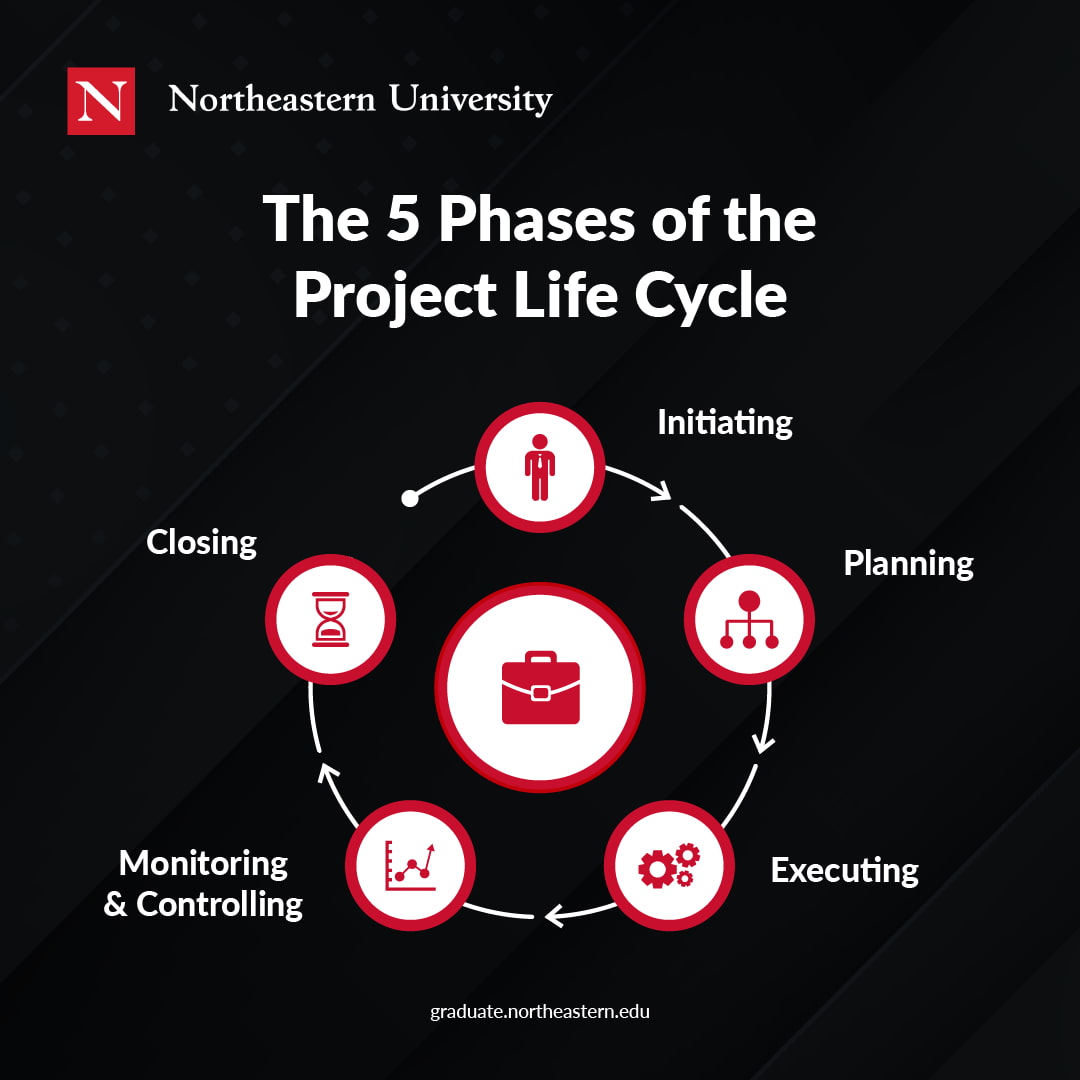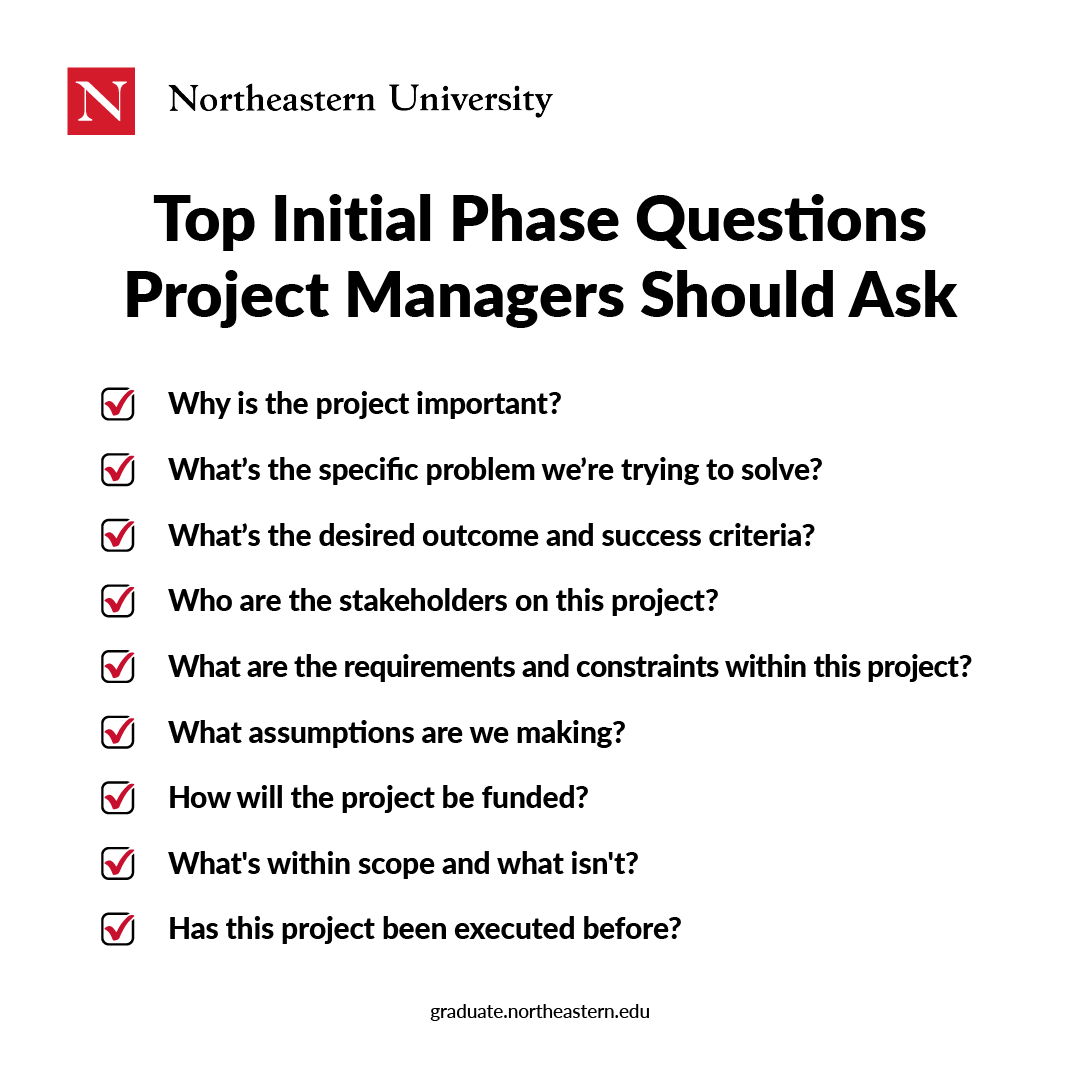Project management has always been an important function in business, and it’s only getting more important as time goes by.
In fact, by 2030, employers will need 2.3 million individuals each year to fill project management oriented roles. To help manage this increasing need, 89 percent of organizations now have a project management office. Clearly, the job outlook for professionals with project management skills is increasingly positive.
If you’re considering a career in project management, you’re likely curious about the different roles and responsibilities you’ll have after earning your degree or certification.
Here’s a closer look at what project managers do—including key responsibilities—so you can better decide if it’s the right career for you.
Download Our Free Guide to Advancing Your Project Management Career
Learn what you need to know, from in-demand skills to the industry’s growing job opportunities.
What Does a Project Manager Do?
In the broadest sense, project managers (PMs) are responsible for planning, organizing, and directing the completion of specific projects for an organization while ensuring these projects are on time, on budget, and within scope.
By overseeing complex projects from inception to completion, project managers have the potential to shape an organization’s trajectory, helping:
- Reduce costs
- Maximize company efficiencies
- Increase overall revenue
The exact duties of a project manager will depend on their industry, organization, and the types of projects a PM is tasked with overseeing. But across the board, all project managers share responsibilities across what’s commonly referred to as the “project life cycle.”
This cycle consists of the following five phases (or processes):
- Initiating
- Planning
- Executing
- Monitoring and Controlling
- Closing

While it may be tempting to think of these as “steps,” they aren’t. Rather, these are processes project managers continually return to throughout the life of a project.
Here’s an overview of each phase of the project life cycle, as well as the different responsibilities a project manager might have in each.
Key Responsibilities of a Project Manager
1. Initiating
Project managers begin each new project by defining the main objectives of the project, its purpose, and its scope. They also identify key internal and external stakeholders, discuss shared expectations, and gain the required authorization necessary to move a project forward.
Important questions project managers ask during the initiating phase include:
- Why is the project important?
- What’s the specific problem we’re trying to solve?
- What’s the desired outcome, and what are the project’s success criteria?
- Who are the stakeholders on this project?
- What are the requirements and constraints within this project?
- What assumptions are we making?
- How will the project be funded?
- What’s within our scope, and what isn’t?
- Has this project been executed before?
- If similar projects have been completed, what were the results and how should they inform future and current projects?

It’s important to recognize that project managers don’t do this on their own. Oftentimes, project managers aren’t involved until much of this work is well underway.
As soon as the project manager is assigned, however, they need to fully engage in the above work which should culminate in a project being chartered and formally assigned.
2. Planning
Once the charter is approved, project managers work with key stakeholders to create an integrated project plan focused on attaining the outlined goals.
The plan established during this process helps project managers oversee the following:
During this phase, project managers outline key deliverables and milestones and identify the tasks that must be completed to bring each project to the finish line.
It’s important to note that project “planning” doesn’t actually end until the project does. The project plan should be treated as a living document that constantly evolves and changes throughout the project.
3. Executing
During this phase, team members complete the work that has been identified in the project plan in order to reach the goals of the project. The project manager’s role is to assign this work and to ensure tasks are completed as scheduled.
The project manager will also typically:
- Protect the team from distractions
- Facilitate issue resolution
- Lead the team in working through project changes
4. Monitoring and Controlling
Despite being listed as the fourth phase, monitoring and controlling processes actually commence at the beginning of a project and continue throughout planning, execution, and closing.
In the monitoring and controlling phase, a project manager’s work includes:
- Monitoring the progress of a project
- Managing the project’s budget
- Ensuring that key milestones are reached
- Comparing actual performance against planned/scheduled performance
Since things rarely go according to plan, project managers must be flexible enough to work within a project’s plan and willing to adapt when necessary.
5. Closing
During this phase, project managers strive to ensure all activities necessary to achieve the final result are completed.
During the close of a project, project managers will:
- Work with the client to get formal sign-off that the project is complete
- Release any resources (financial or personnel) who are no longer needed for the project
- Review the work of third-party vendors or partners to close their contracts and pay their invoices
- Archive project files for future reference and use
After the project has been completed, a post-implementation review is often used to identify key lessons learned. Understanding what went well, what could be done differently, and what to stop doing can help inform and improve project management practices moving forward.
Is Being a Project Manager Stressful?
Project managers’ tasks vary substantially depending on which phases of the life cycle their projects are in. However, there are a number of general tasks that any good project manager can expect to perform on a daily basis.
Some of these responsibilities include:
- Communicating with team members: Project managers must regularly communicate with members of their team via email, phone, daily check-ins, or team meetings to determine the status of various projects and identify potential roadblocks.
- Communicating with key stakeholders: Project managers must consistently update key stakeholders on project progress and relevant data to ensure the project still aligns with changing company initiatives.
- Issue identification and resolution: Project managers must ensure any issues related to scope, budget, and resource allocation are resolved effectively to keep projects on track.
- Budgeting: For small-scale projects, cost estimation may be a weekly or even a monthly task. But for larger projects with many different expenses to keep in mind, project managers may review budgets or invoices from outside vendors daily to ensure the project doesn’t exceed resource allocations.
- Time management and approval: Many project managers turn to timesheets or a project management software to see how their team is spending their time and whether projects remain on track.
- Team-building: A good project manager will keep their team productive and happy. This can be achieved through team-building exercises to boost morale—particularly after challenging weeks or phases of the project—or organizing a weekly lunch or happy hour.
Due to these responsibilities, project managers must exhibit a variety of soft skills and technical skills to effectively manage an entire team and successfully meet project goals. To avoid stress, project management professionals must be well-versed in the project management process. A successful project manager should have excellent time management skills and always be focused on achieving the team’s project objectives.
Project Management vs. Portfolio Management vs. Program Management
Project management is an umbrella term which can actually refer to three different types of management: Project management, portfolio management, and program management.
While these disciplines are all similar and interrelated, they each have unique differences that impact the responsibilities of project managers in their given roles.
Three types of interrelated project management disciplines include:
- Project Management: In a traditional project management role, the objective is to complete a project successfully, while remaining on time and within budget. Project managers utilize a variety of project management strategies to help organize teams and complete projects according to their success criteria while engaging stakeholders appropriately.
- Program Management: A program is the coordinated management of a set of interrelated or similar projects to achieve an organization’s objectives in a way that’s not possible if managed separately. Program managers collaborate with project managers to ensure each project is strategically aligned and on track to hit major milestones. Program managers also facilitate organizational change, manage the dependencies between projects, and address any project- or organizational-level issues and risks that affect the program.
- Portfolio Management: A portfolio is the organization’s collection of programs, projects, and operational work. Portfolio managers work with the organization’s leaders to identify, prioritize, select, balance, authorize, evaluate, and control the organization’s approved work to best meet its strategies, given resource capacity and risk.
Developing Project Management Skills For Success
If you’re interested in pursuing a career in project management, it’s critical that you develop the necessary skills to execute the tasks assigned to you. Earning an advanced project management degree is one way to learn and improve those skills, increase your salary, and enhance your marketability to employers while giving you hands-on experience in the field.
To learn more about advancing your career in project management, download our free guide below.
Editor’s note: This article was originally published in July 2017. It has since been updated for accuracy and style.







Related Articles
Master’s in Project Management or an MBA: What’s the Difference?
6 Project Management Trends Emerging in 2023
Master’s Degree Comparison: Sports Leadership vs. Sports Management